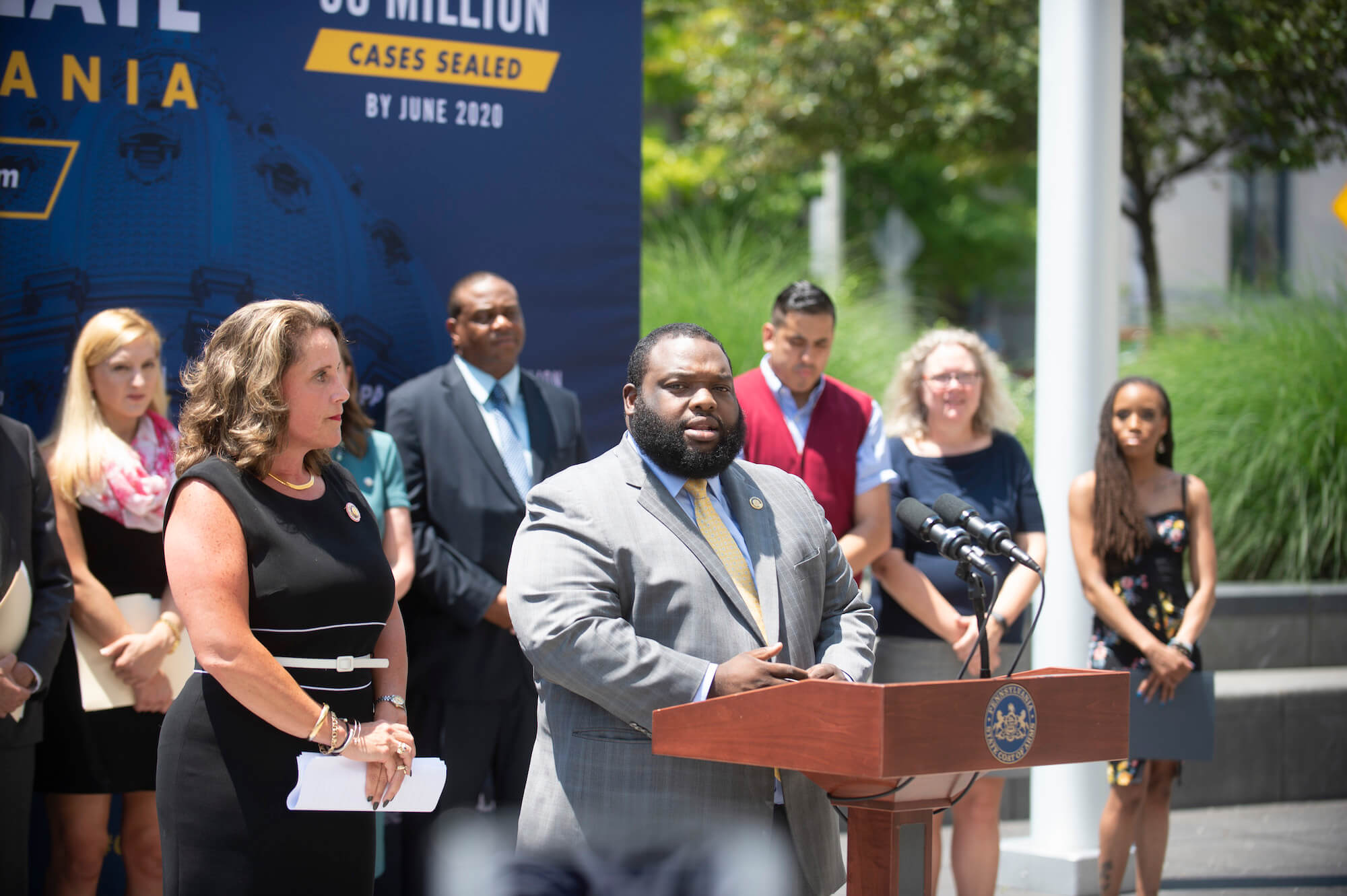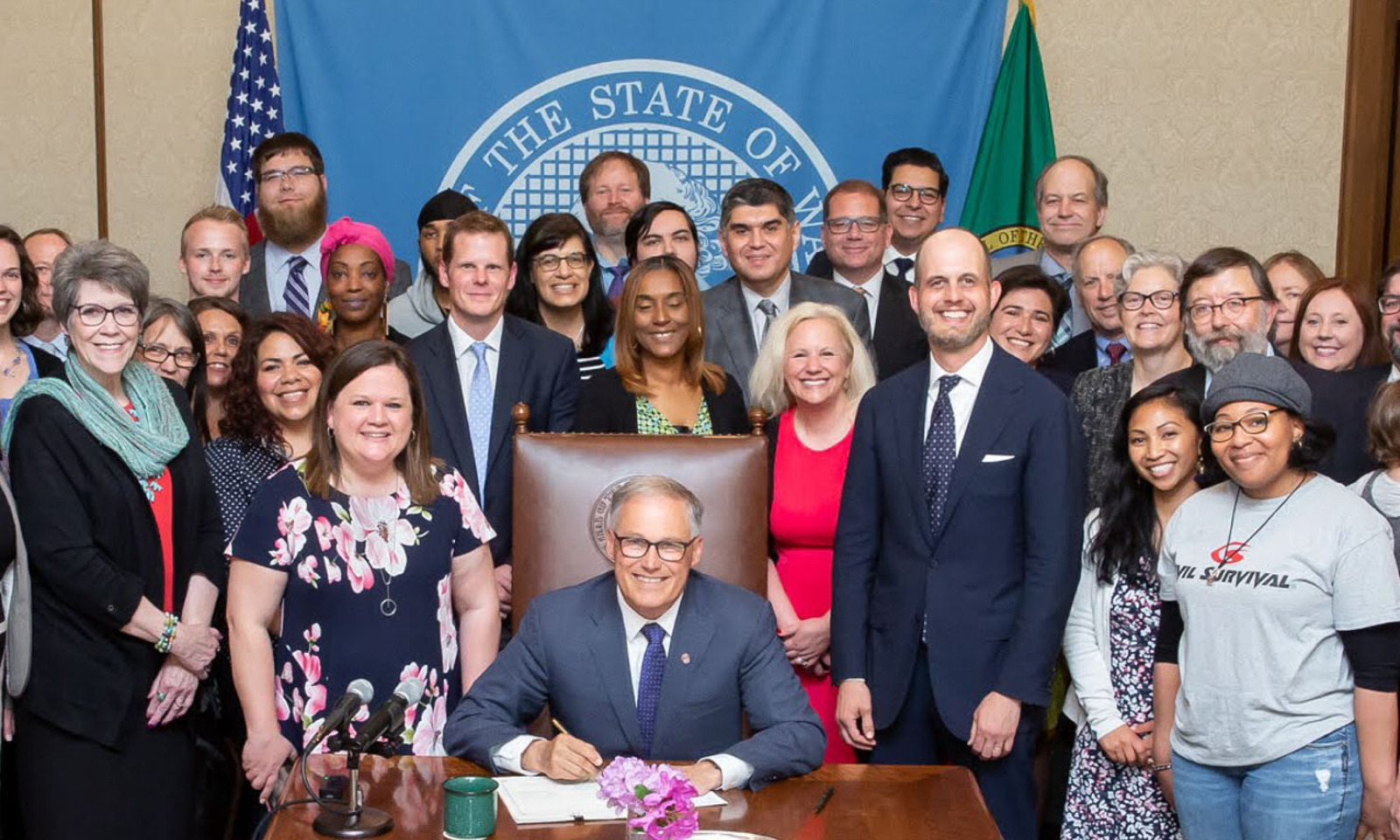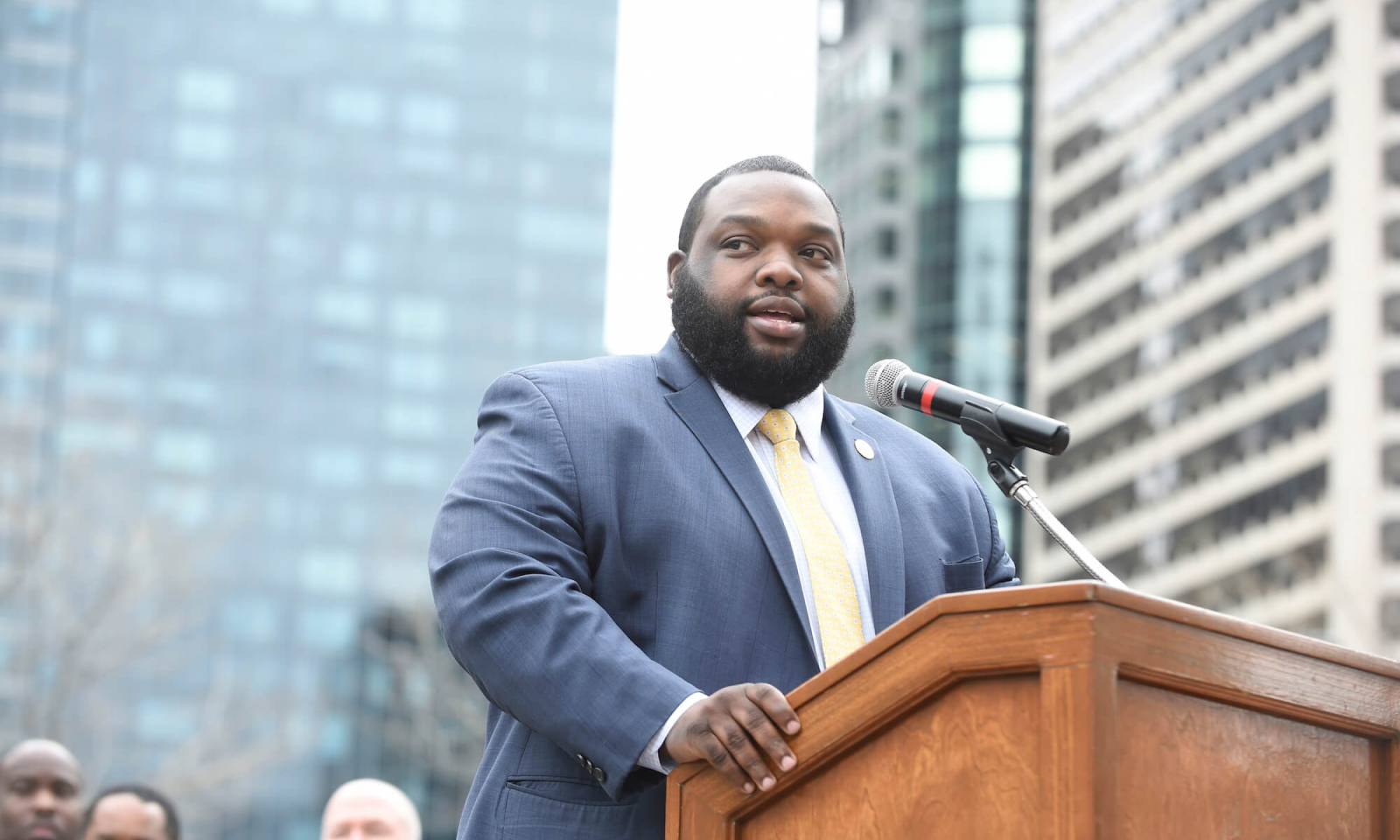SEP 18, 2019 · 16 min read
A Closer Look at the Impact of Record Clearing and Clean Slate Policies

September 21-28, 2019 marks the 2nd Annual National Expungement Week. During this time, organizations across the country will help millions of people with criminal records find their second chances through record clearing (the sealing or expunging of records for those with criminal convictions).
Today, one in three adults in the U.S. has a criminal record. They face nearly 50,000 different legal barriers to accessing education, loans, housing, jobs and more because of them. Record clearing can change that. And it’s become one of the most successful bipartisan issues agreed upon and carried out in recent times. In fact, 71% of Americans across party lines support clean slate policies. Last year, the first Clean Slate bill was passed and signed into law in Pennsylvania. This year, Utah followed suit, and similar efforts are gaining momentum in North Carolina, Michigan, California and other states across the country.
We met with Nila Bala, Tarra Simmons and Representative Jordan A. Harris (D-PA), three critical players in Clean Slate policy reform in their respective states, to hear more on the impact of record clearing and how it can be expanded.

Nila Bala
R Street Institute
Associate Director, Criminal Justice & Civil Liberties; Senior Fellow
Connecticut and Michigan Clean Slate Efforts
Nila Bala is the Associate Director of Criminal Justice & Civil Liberties and Senior Fellow at R Street Institute, a public policy research organization dedicated to forming transpartisan coalitions across the political spectrum. Inspired by her clients and the power of second chances, she now oversees reentry, Clean Slate and expungement policies. Nila got her start as a public defender in Santa Clara County and also served as an attorney in Baltimore City, Maryland, at the Wabash Courthouse. She is now supporting Clean Slate efforts in Connecticut and Michigan by coordinating leaders on the political right and educating lawmakers on the state level.
As a public defender, you’ve seen firsthand the effects of having a criminal record. How does a criminal conviction harm individuals after they’ve completed their sentences?
The harms often extend far beyond their sentences. The most obvious way that it affects people is employment. It’s very routine that employers do background checks, and if they see your name come up, they likely won’t look any further. It can really hurt people because they don’t get a chance to prove themselves. We also know from research that these individuals are often the most loyal and hardworking employees.
Besides jobs, it affects their families and children if they’re unemployed or underemployed. And we know that children of incarcerated individuals are far more likely to get caught up in the justice system. It affects our communities. A lot of housing is restricted and their family’s housing might be jeopardized. It affects education. Many individuals need monetary support — and we know that once these folks get their degrees their job prospects increase — but they can’t get their foot in the door because they’re not eligible for financial aid.
One in 3 adults in America has a criminal record. What does it mean for them to be eligible to clear their records?
Eligibility is part of it, and that’s huge. When you tell someone that they don’t have to have this come up every time they apply for an opportunity, there’s such a sense of relief that they can move on. For some of these individuals, it’s been decades since they made that mistake.
The other part is access to the expungement. The people most impacted by our justice system often lack access, right? So in most jurisdictions, at least in the research I’ve done, there are far more people who are eligible for relief but just don’t know it. Or maybe they know it but they haven’t been able to do the paperwork or get the money to pay for it.
Clearing records simply isn’t enough though. From a cost-savings perspective, why is it so important to automate this process?
Criminal justice is expensive. Prosecution is expensive. Jail and prison are expensive. Probation and parole are expensive. The cheapest thing is to keep people out of the system and back in society as thriving members of our community.
Automation takes the burden off individuals. Once their records are automatically cleared, they have more opportunities to get jobs and make higher wages. Now they have incomes, can support their families and afford housing and other services that the state was formerly helping to subsidize or pay. Then, they become consumers in our economy. So our economy benefits because they have more money to spend. And then there are also public safety benefits. Employment reduces recidivism. Once they have good-paying jobs, our communities are less likely to experience more crime.
Automation is also hugely beneficial because to previously receive expungement, individuals would have to file a bunch of paperwork, the court clerks would have to review and the district attorney or prosecutor would have to look at eligibility and make a recommendation to the judge. If you eliminate that docket, you eliminate all those people’s time and expenses. If we make this automatic, the justice system saves a ton of money.
Why do persons with a criminal conviction deserve a second chance?
A second chance means they can be more than that single story and more than the worst thing that’s ever happened to them. We all make mistakes. If you think back to the worst thing you’ve ever done, would you want to be defined by that? That’s what a criminal conviction can do for a person. It defines them in our system today. It means that every employer, every landlord, every educational institution is looking at that first and foremost instead of all the positive attributes an individual brings to the table.
After a few years, a person with a criminal record is no more likely than anyone else in the public without a record to commit another crime. Why are we having them shoulder this burden for their whole life? Why are we sentencing them to poverty, stigma and humiliation forever? It may seem like it isn’t that big of a deal, but for the person affected, a second chance can change their life.

Tarra Simmons
Public Defender Association
Director of the Civil Survival Project
Washington Clean Slate Campaign
Tarra Simmons is an attorney and the Director of the Civil Survival Project at Public Defender Association in Seattle, Washington. She was incarcerated for two years after suffering trauma and a substance use disorder. Tarra’s lawyers encouraged her to go to law school so that’s just what she did after she completed her sentence. In law school, she found power in advocacy and worked on efforts to remove barriers to entry for formerly incarcerated people. One of her most notable wins was the bipartisan New Hope Act, which makes record clearing possible. It was signed by Washington Governor Jay Inslee on May 9, 2019.
As an impacted person and a mother, how have you personally been held back by your criminal history?
I’ve been held back in a lot of different ways. When I was first released from prison, the only job I could get was at a fast food restaurant. I couldn’t find anybody to rent [a home] to me and my two sons. While I was studying for the law school admissions test, I was homeless for a short period of time. In law school, I was denied internships because of my criminal record. One of the most difficult things, as a mother trying to break generational cycles of poverty and incarceration and substance use disorder in my family, was being outright denied the ability to volunteer in my own child’s classroom because of my criminal history — even after overcoming so much and becoming an attorney. And, you know, becoming an attorney was a challenge, too. I was denied the opportunity to take the bar exam and had to appeal to the Supreme Court.
The collateral consequences are so far reaching that most people don’t even have an understanding of how entrenched they become. And it seems like the punishment never ends — no matter how hard you try to show that you’ve changed and you’ve learned from your experiences.
Given your deep connection to this experience, what does record clearing mean to you?
Record clearing means that people can live up to their greatest potential. You no longer have to disclose your criminal history on applications. You’re no longer limited in your ability to gain opportunities that have historically been barred.
You led a coalition last year that passed the New Hope Act, which makes record clearing possible. How does the New Hope Act expand opportunities for those who have criminal records and their communities?
For the individual, it can have a profound impact. But if you think about the families and children who are suffering when one of their adult members isn’t able to access economic stability, that ripple effect is even more profound.
For the community, the criminal justice system disproportionately harms communities of color. I think about this often with my own son, who identifies as black, and the fact that he’s never had a teacher that looks like him. I wonder how much of that is because of lack of opportunity, but then also because of the criminalization of black and brown people at higher rates. If families can earn a living wage, they’re more likely to be able to look outside of their own immediate surroundings and uplift the community around them.
How can you build on that bipartisan coalition, alongside formerly incarcerated leaders, to push for automation?
We have a huge coalition of very diverse folks from prosecutors and victims to formerly incarcerated people and judges. We want to build on that momentum and add in some new voices as we look toward automation of record cleaning. The business community is especially important. We want them to see firsthand that this is an opportunity for them to expand their employee pool. Everybody wants good employees, but if we’re overlooking a whole demographic of people, employers are losing out.
How have you seen the New Hope Act’s impact firsthand?
There have been tears of joy. There have been celebration messages sent to us on social media. They’re just, you know, going on for days about how important this means to them. It keeps me energized to fight. But I know that with every single person who has been able to navigate the process, there’s probably 10 people who either don’t know that they’re eligible, have struggled with navigating the process or haven’t had an advocate there to help them. We have more work to do to make record clearing automatic.
National Expungement Week is a unique opportunity to shine light on this issue. What’s your biggest hope during this time?
I really appreciate that we’re organizing across the country around National Expungement Week. I hope that through all of us putting our energy into communications we’ll reach more people and they’ll start to understand their rights. Or, at least, become aware of the fact that this could be possible and they reach out for more information or have a consultation with an attorney.

Representative Jordan A. Harris
186th Legislative District
Philadelphia County, PA
Pennsylvania Clean Slate Act
Democratic Representative Jordan A. Harris was elected to office in 2013 and serves Philadelphia County, Pennsylvania. He was also the chairman of the Pennsylvania Legislative Black Caucus from 2017-2018. In a previous life, Rep. Harris was a Philadelphia public school teacher before turning his attention to criminal justice reform. He made major strides in 2019 with his historic signing of the Clean Slate Act, making Pennsylvania the first state in the country to pass Clean Slate legislation.
What drove you as a lawmaker to be the first in the nation to pass a Clean Slate law? Why are you motivated by this issue?
As a legislator, I’ve been working on criminal justice reform issues since I was sworn in. And the reason for that is because, fundamentally, I believe that the criminal justice system has been unjust to a lot of black and brown people and marginalized people. Justice is only as much as you can afford, and those who can’t afford justice typically don’t get it.
So when I looked at a lot of my friends and family members and members of my community, one of the barriers to becoming gainfully employed and truly lifting people out of poverty was their decades-old criminal records. It was a perfect opportunity to marry some of the things that I’m passionate about and also pass legislation that I thought would have an impact on the community.
Record clearing automation is critical to Clean Slate’s success. From an economical opportunity perspective, why is this so important?
Take a person who, with a record, is making $10 an hour. After you seal their record, now they’re able to move up in their job and make $15, $20 an hour and beyond. What we’re talking about is literally lifting people out of poverty. It makes absolute fiscal sense. It also helps lower recidivism rates. And the fact is, most business owners will tell you they need employees, and when they typically hire people who have criminal records, they’re great employees.
As quick as we were to lock up the person who committed a crime — rightfully so — we should be just as quick and as eager to help them get their life back on track after they’ve paid their debt to society. Why are we putting more hurdles in front of a person who’s trying to do the right thing? It’s counterproductive. So for me, automation just makes sense.
In PA, the Clean Slate campaign was delivered by a diverse range of folks, including professional football players. What led you to that decision and how did they help deliver the message?
Someone came to us and said that Chris Long, Malcolm Jenkins and Torrey Smith were interested in getting involved. So, you know, first off I thought why not?! We needed additional voices to lift the conversation. Then I found out that Torrey Smith’s mother is a formerly incarcerated person who had a felony charge. So, he had a personal story that was even deeper. And second, the Eagles were having an amazing season. [laughs]
Currently in PA, only misdemeanors can be cleared — not felony convictions — and there’s a 10-year wait period. What can we do to ensure that more people benefit from having their records cleared while also maintaining public safety?
When I introduced my first piece of legislation around record sealing back in 2013, the time frame was seven years. So, 10 years was the consensus number that we could get everyone to agree to. There’s lots of data that show the downward trajectory of a person reoffending after year five. I think the wait period should match up with that.
The other thing that I think we have to do is expand Clean Slate to drug felonies, because, in my opinion, the war on drugs has been nothing more than a war on people. There are far too many people and industries missing out on employment because of drug convictions. Now, I’m not talking about someone like El Chapo. But what I am talking about is all of those folks, particularly folks during the crack epidemic, who would be treated as if it were a healthcare issue and not a criminal issue.
And here’s the other thing with felonies; there are people who took deals and got probation and never did a day in jail. If they’re not that dangerous to warrant incarceration, they shouldn’t be stuck with a felony charge that disqualifies them from opportunities. I believe if we get to that level, we will see true transformational change with regards to how we address the levels of poverty and displacement in Pennsylvania.
What actions are you taking to build upon your historic win with PA’s Clean Slate bill?
Republican Representative Sheryl Delozier is, what you would call, my partner in reform. We’re working on occupational licensing reform in Pennsylvania because the state has more than 30 different occupational licensing boards for barbers to hair braiders and accountants to nurses. Many of them have very vague clauses that are used to deny licenses to people with criminal records.
In addition to that, we’re working on probation reform by either capping the amount of time a person can be on probation or adding a clause where for however many days you’re on probation without any incidents, you get “X” amount of time off your probation. One of the critical parts is changing the way we do technical violations. The reason that’s so important in Pennsylvania is because people who are sent to jail for 30, 60, 90 days for a technical violation often get their charges dropped by the judge. But they just wasted 90 days in jail. They can’t get those days back. And there are so many collateral consequences that impact the rest of their lives.
National Expungement Week is a unique opportunity to shine light on this issue. What’s your biggest hope during this time?
When I was growing up, and I’m sure when you were growing up, you heard the statement, “Don’t judge a book by its cover.” Well, that’s a criminal record. Most people don’t open the book to read it if it says “criminal record” on the cover. No person should ever be judged by their worst day.
Further Reading: Find out more about Clean Slate bills in Pennsylvania and Utah.



